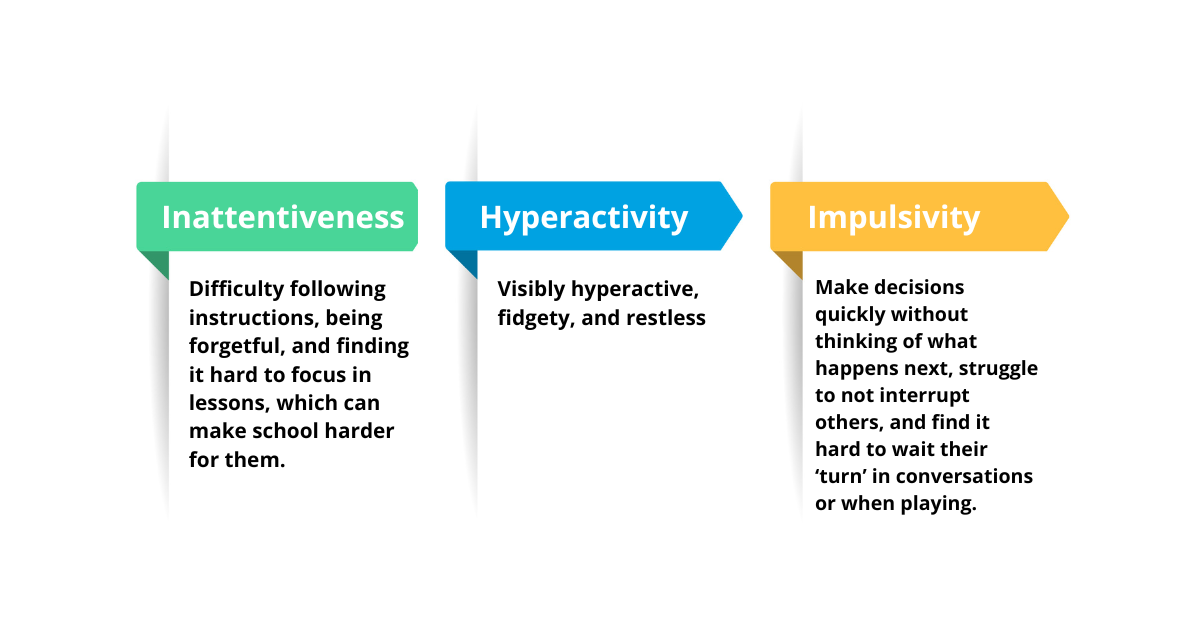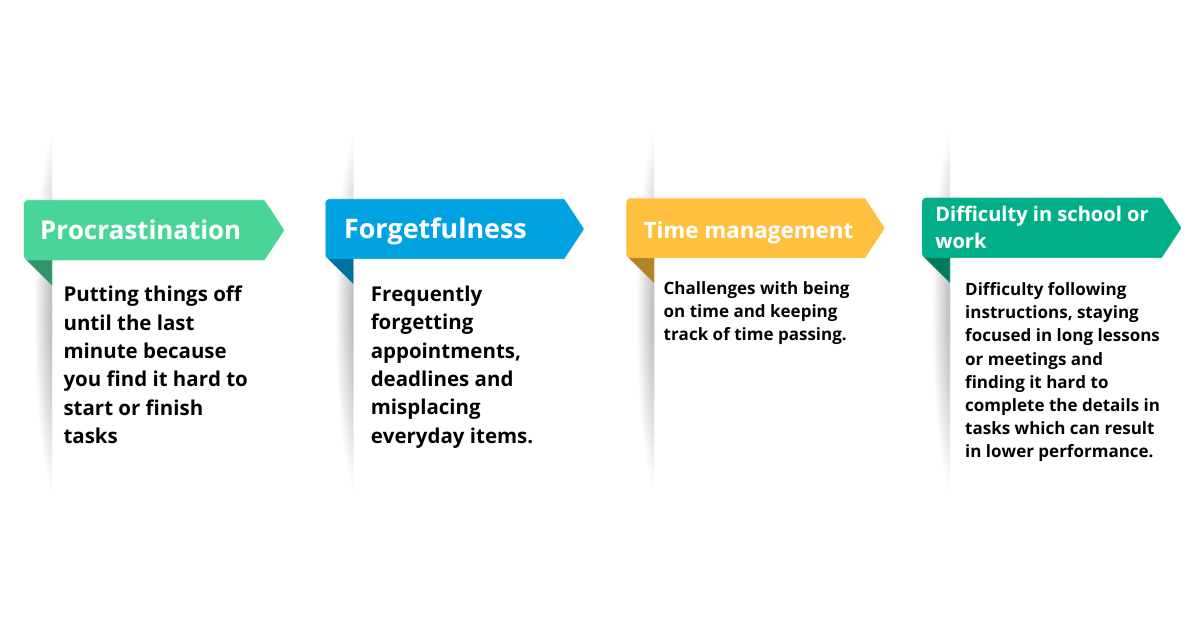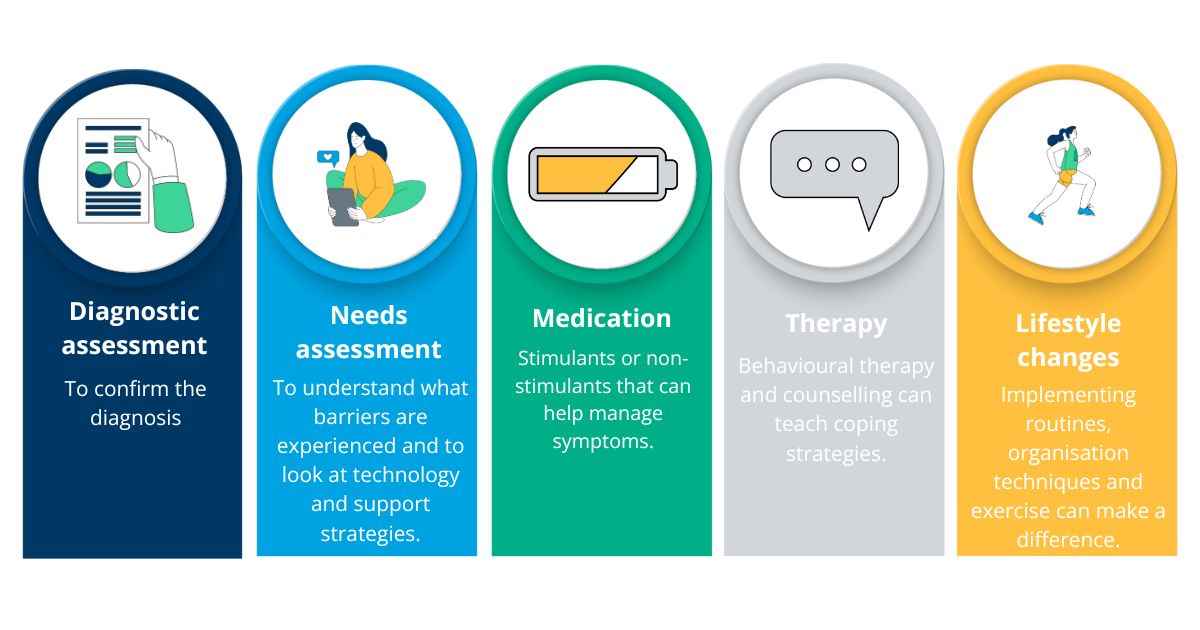ADHD – what is it and how do I know if I have ADHD?
Attention-Deficit/Hyperactivity Disorder (ADHD) is a neurodevelopmental condition that affects millions of people across the world. Individual differences mean that every person with ADHD has a different experience, but we do know that there are common traits and behaviours associated with ADHD.
This blog post will guide you through recognising the signs, understanding the causes, knowing when to seek support, exploring what kind of support is available, and understanding co-occurring conditions (when you experience two or more conditions at the same time). If you think that the traits of ADHD might relate to you or your child’s experiences, this article aims to be your first step toward understanding and managing it.
Common ADHD traits
ADHD presents in various ways, but here are some common traits to look out for:

Common behaviours of people with ADHD

Causes of ADHD
Like many other neurodevelopmental conditions (such as autism and dyslexia), researchers have not been able to work out the exact causes of ADHD. But we do think it is a combination of genetic, environmental, and neurological factors. ADHD can run in families, so genetics has been suggested as a significant factor in developing the condition. Research has observed differences in brain function and neurotransmitters in people with ADHD, compared to neurotypical people (people who are not neurodivergent, like autistic people, dyslexic people or people with ADHD).
When to look for support
If you or someone you know regularly experience challenges in everyday life that look or feel like ADHD traits or behaviours, there are qualified and knowledgeable people who can help. In the UK, these people include GPs and special educational needs coordinators (SENCOs) who can refer you to ADHD specialists within the NHS (like clinical psychiatrists). But there is also support available from educational psychologists and specialist needs assessors through companies like us.
What support is available:
ADHD can be managed effectively with the right support and treatment. This may include:

Co-occurring conditions
ADHD often occurs alongside other conditions, such as:
- Anxiety: anxiety disorders and ADHD share symptoms like restlessness and difficulty concentrating.
- Depression: people with ADHD may be at a higher risk of developing depression.
- Specific learning difficulties: other neurodevelopmental conditions, like dyslexia, can accompany ADHD.
- Autism: autism and ADHD share symptoms such as difficulty focusing or intense focus.
How can we help?
Although you don’t need a diagnosis to accept and start embracing your neurodivergence, some people feel they benefit from being able to associate specific terms with their experiences. A diagnostic assessment can help identify the strengths and weaknesses you experience in certain abilities and equip you with recommended strategies for learning and working your way. A diagnosis of specific learning difficulty (SpLD) with traits of ADHD is also recognised under the 2010 Equality Act and can help with getting reasonable adjustments at work or personal learning plan at school or university, as well as making you eligible for government support schemes such as for Access to Work or Disabled Students’ Allowance.
You can also talk to our Support team about having a needs assessment with us: needs assessments are a more informal meeting where you chat with one of our friendly assessors and co-create strategies to help you excel in everyday life. The needs assessment will explore and help you to understand your diagnosis, how your cognitive profile impacts on your learning and working, as well as your strengths and weaknesses. They will then work with you to create personalised strategies to help you learn and work your way, which cover areas like:
- Reading and research
- Writing and composition
- Meetings, presentations and note-taking
- Time management and organisation
- Revision and exam preparation
- Environment
- Wellbeing
- Potential reasonable adjustments (if you work for an employer)
They may also recommend assistive technologies that might support you day-to-day, like:
- Wellbeing and mental health software or apps
- Text to speech software
- Speech to text software
- Mind mapping software
- Spell checking software
- Grammar checkers
- Note-taking software and apps
The ultimate aim of our diagnostic and needs assessments is to provide solutions to shape your future, empowering you with confidence in and knowledge about your neurodivergence so that you can excel in everyday life.

